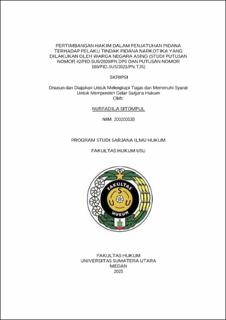| dc.description.abstract | Narcotics crime is a form of transnational crime that poses a serious threat to many countries, including Indonesia. The distribution and abuse of narcotics are not only committed by Indonesian citizens but also involve foreign nationals (WNA). This research focuses on the following problem formulations: How is the criminal law regulation regarding narcotics crimes committed by foreign nationals? How is the application of the principles of criminal law to perpetrators of narcotics crimes who are foreign nationals? And how is the analysis of judges' considerations in sentencing perpetrators of narcotics crimes who are foreign nationals based on Decision Number 42/Pid.Sus/2020/PN.Dps and Decision Number 180/Pid.Sus/2021/PN.Tjs?
The research method used in this study is normative juridical research, which aims to analyze the criminal law regulations related to narcotics offenses committed by foreign nationals and how the principles of criminal law are applied in such cases. The data were obtained through a literature study, including legislation, legal doctrines, and relevant court decisions.
The research results show that in rendering decisions, judges consider various aspects, including evidence, the degree of the defendant’s culpability, and the impact of the committed crime. In Decision Number 42/Pid.Sus/2020/PN.Dps, the defendant, Tatiana Firsova, was sentenced to 1 year and 7 months in prison for being proven guilty of narcotics abuse for personal use. Meanwhile, in Decision Number 180/Pid.Sus/2021/PN.Tjs, the defendant, Declan Christopher, was sentenced to 5 years in prison and fined Rp1,000,000,000 for being proven guilty of possessing a large quantity of Class I narcotics. From these two decisions, it can be concluded that the application of criminal law to foreign nationals in narcotics cases remains based on the principles of territoriality, passive nationality, and protection. However, there are differences in sentencing, which are determined by the quantity and type of narcotics possessed and the purpose of their use. Therefore, this study is expected to provide insights for law enforcers in handling similar cases in the future | en_US |


